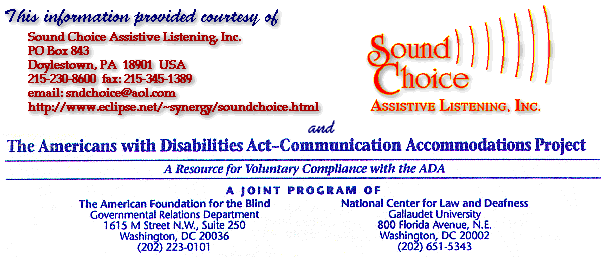
MEMORANDUM ON THE OBLIGATIONS
OF HOTELS AND MOTELS UNDER THE AMERICANS WITH DISABILITIES
ACT
Hotels and motels must be accessible to individuals with
disabilities, pursuant to Title III of the Americans with
Disabilities Act (ADA), 42 U.S.C. 12101 et seq. The Justice
Department has written a regulation to implement Title III.
28 C.F.R. Part 36.
The Americans with Disabilities Act
was signed into law on July 26, 1990. The law and
regulations became effective for hotels and motels on
January 26, 1992. The implementation date of the law was
carefully chosen to give places of public accommodation
adequate notice of their new duties under the
law.
The ADA defines a "place of public
accommodation" to include:
[a]n inn, hotel,
motel, or other place of lodging, except for an
establishment located within a building that contains not
more than five rooms for rent or hire and that is
actually occupied by the proprietor of the establishment
as the residence of the proprietor. 28 C.F.R. Section
36.104.
Auxiliary Aids
Places of public accommodation have a
duty to provide auxiliary aids and services to individuals
with hearing impairments where necessary to ensure effective
communication with individuals with disabilities. 28 C.F.R.
Section 36.303(c). "Auxiliary aids and services" are defined
to include:
Qualified interpreters,
notetakers, computer-aided transcription services,
written materials, telephone handset amplifiers,
assistive listening devices, assistive listening systems,
telephones compatible with hearing aids, closed caption
decoders, open and closed captioning, telecommunications
devices for deaf persons (TDDs), videotext displays, or
other effective methods of making aurally delivered
materials available to individuals with hearing
impairments. 28 C.F.R. Section 36.303(b)(1).
For hotels and motels, this means that
access to telephone and television service is required. The
regulation specifies the following services to provide this
access:
- (d) Telecommunication devices for
the deaf (TDDs)
- (1) A public accommodation that
offers a customer, client, patient, or participant the
opportunity to make outgoing telephone calls on more than
an incidental convenience basis shall make available,
upon request, a TDD for the use of an individual who has
impaired hearing or a communication disorder.
- (e) Closed caption decoders.
Places of lodging that provide televisions in five or
more guest rooms and hospitals that provide television
for patient use shall provide, upon request, a means for
decoding captions for use by an individual with impaired
hearing.
28 C.F.R. Section 36. 303 .
The analysis to the regulation
explains that, unlike other places of public accommodation
(which may not offer the opportunity to make outgoing calls
on more than an incidental convenience basis), hotels and
motels must have TDDs available so that deaf customers can
make outgoing calls from the hotel. Additionally, the
hotel's front desk must have a TDD to receive calls from the
hotel's guests. In this way guests with hearing impairments
can avail themselves of such hotel services as making
inquiries of the front desk and ordering room service. 56
Fed. Reg. 35567 (July 26, 1991). Although the DOJ rule
prohibits the assessment of a charge or "surcharge" for
compliance with this section, 28 C.F.R. Section 36.301(c),
the analysis does state that "reasonable, completely
refundable deposits" are not considered surcharges
prohibited by this section. "Requiring deposits is an
important means of ensuring the availability of equipment
necessary to ensure compliance with the ADA. 56 Fed. Reg.
35564 (July 26, 1991).
New and Altered Hotel
Construction
In addition to the requirement to
provide auxiliary aids, hotels must also remove
architectural barriers, including communications barriers,
that are "structural in nature." New and newly renovated
hotels must be built to comply with very explicit
requirements in a document titled "Americans with
Disabilities Act Architectural Guidelines
(ADAAG).
ADAAG requires at least 4 per cent of
the first 100 hotel rooms and approximately 2 percent of
rooms in excess of 100 to be accessible to both
mobility-impaired and deaf individuals, plus an identical
percentage of additional rooms must be accessible to deaf
individuals. Therefore, at least 8 percent of the first 100
rooms in new or renovated facilities must have built-in
visual alarms, visual notification devices, volume control
telephones, and an accessible electrical outlet for a TDD in
proximity to the telephone. The accessible rooms must be
dispersed among the various classes of sleeping
accommodations (e.g., luxury to basic).
There are other "structural"
requirements addressed by ADAAG, including the obligation to
install pay TDDs and other accessible telephones where
public telephones are available. ADAAG also addresses the
obligation to make meeting rooms, assembly areas and
conference rooms accessible by means of assistive listening
systems.
You can get a copy of ADAAG (and the
full Title III regulations) by contacting:
Office on the Americans with
Disabilities Act
Civil Rights Division
US Department of Justice
PO Box 66118
Washington DC 20530
(202) 514-0301, (202)514-0383 (TDD)
Existing Hotel Facilities
Existing hotel facilities have
obligations that are similar, but more limited, than the
obligations of new or renovated facilities. They must also
remove structural architectural barriers, including
communications barriers that are structural in nature, but
only where such removal is "readily achievable." 28 C.F.R.
Section 36.304(a). The Justice Department regulation gives
the example of installing flashing alarm lights as removal
of a barrier, so that deaf individuals will be alerted to
fires and other emergencies. 28 C.F.R. Section 36.304(b)(7).
In most cases, this change can be readily achieved, since
portable units can be installed in a room without unduly
expensive wiring and other structural changes. As with newly
constructed hotels, a hotel is not obligated to make more
than 8 per cent of its rooms barrier free for deaf
individuals.
Note that the minimum percentages
apply only to the requirement to remove "structural"
architectural barriers. There are no such limits to the
requirement to provide "auxiliary aids" such as TDDs and
decoders. TDDs and decoders must be provided on request, as
long as the requests to provide such services do not
constitute an "undue burden" on the hotel
facility.
Funded by a Grant
from the U.S. Department of Justice
|